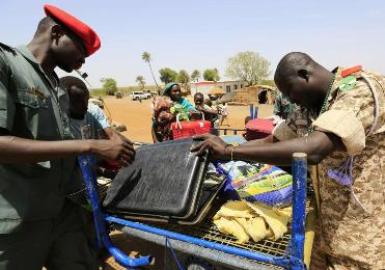Khartoum could close border with S. Sudan over Juba support to rebels
March 17, 2016 (KHARTOUM/JUBA) – A Sudanese presidential aide Ibrahim Mahmoud Hamid on Thursday warned that his government may close the border with South Sudan if Juba continues its support to rebel groups in Darfur and the Two Areas.

“If the South Sudan does not stop supporting the insurgency we will have to take action to protect the country, even if it led to the closure of the border again,” he said, adding “We are waiting for the implementation of the Cooperation Agreements signed with the South Sudan since 2012, so there will be no security problems between the two countries.”
The renewal of accusations comes after reports in Khartoum about meetings in Juba between senior South Sudanese officials and SPLM-N leadership to discuss the needs of the Sudanese rebels who are facing a large scale military campaign in the Blue Nile and South Kordofan states.
Last January, President Omer al-Bashir announced the opening of border with South Sudan for the first time since its secession in July 2011. Also it reduced oil transportation fees and decided to open river transport with the South Sudan.
According to the official news agency SUNA, the governor of White Nile state Abdel Hamid Kasha on Wednesday called for the withdrawal of the South Sudanese troops from the border with Sudan, adding that the presence of the SPLA soldiers hinders Khartoum’s decision to open the border.
Kasha made his statement during a meeting with an American diplomat from the Office of the U.S. Special Envoy for Sudan and South Sudan who visited the border state where are the camps of South Sudanese refugees.
In a statement he issued on 26 January, President Salva Kiir instructed to withdraw South Sudan army units on the border with Sudan, to “at least five miles south of our common borders of 1st January 1956, in accordance with our commitment to the terms of The Comprehensive Peace Agreement (CPA) of 2005 with Khartoum”.
SPLA TROOPS ARE AT 1 KM
However the top command of the South Sudanese army on Thursday denied the accusations of failing to implement the presidential order.
“That order has been complied with long time ago. Our forces have been withdrawn more than 1 kilometre away from the common border with Sudan but they want us to go beyond that, which has security concerns,” South Sudanese presidential advisor on security affairs, Tut Gatluak, told Sudan Tribune on Thursday when asked to comment on the matter.
Gatluak said the government was concerned that “negative and hostile” rebel forces could take advantage of movement away from the common border and may use the area for activities which may compromise security between the two countries.
The new deputy chief of general staff for finance and administration, Lieutenant General James Ajonga Mawut Ajonga, also confirmed that government forces have complied with the order after the army’s chief of general staff, Paul Malong Awan, sent out to all units at the border with Sudan to act in compliance with the order of the president.
“In the army, there is a culture of command, order and comply, which is the guiding doctrine world over for the military. When the office of the commander in chief issued the directives, the chief of general staff received it and acted immediately. He issued instructions to all the units and our troops at the common border with Sudan and they complied,” said Ajonga.
Sudan closed its border with the South Sudan in June 2011, one month before the formal declaration of independence.
At the time, the decision intervened days after the start of a rebellion in the South Kordofan by the Sudan People’s Liberation Movement North (SPLM-N). Khartoum accused Juba of supporting the former members of the ruling party in South Sudan.
(ST)
